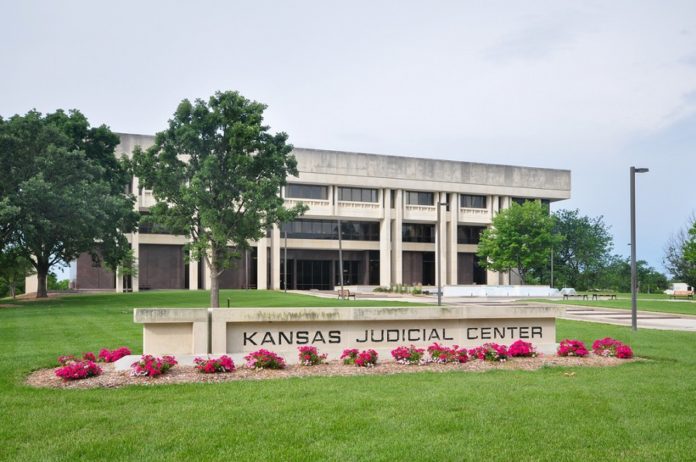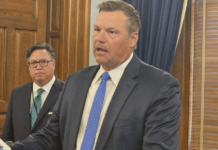(Updated to include response from House speaker and more details about salaries)
The Kansas Supreme Court on Wednesday dismissed a lawsuit brought by six judges asking that the Legislature be ordered to put millions of dollars more funding into judicial salaries.
The court set aside the lawsuit after concluding that “difficult evidentiary and legal issues” would take an extensive amount of time to resolve the case.
The justices also extended a legal olive branch to the Legislature, saying they they didn’t want to infringe on its budget-making authority.
“We have the utmost respect for our state’s republican form of government under which three coequal branches of government each perform the unique functions entrusted to them by our carefully calibrated constitutional structure,” Chief Justice Marla Luckert wrote for the court.
“Accordingly, we are mindful of the good-faith civil commitments we must necessarily make not to encroach on the Legislature’s budget making province within constitutional boundaries,” she wrote.
However, the court recognized the significance of insulating judicial budgets and salaries from attempts to politically strong-arm the judiciary.
The court said it understood how judicial branch employees — judges and court staff — have been demoralized working at significantly below-market pay levels.
“We understand why dedicated public servants in the judicial branch have legitimate concerns about losing talented, hardworking judges and employees to state agencies, county governments, the federal government, the private sector and academia.”
“We stress that more is at stake here than the personal remuneration of judges and judicial branch employees,” Luckert wrote.
“The constitutional guarantees exist not to ‘benefit the judges’ but ‘as a limitation imposed in the public interest’ of protecting fair and impartial courts that implement and execute the constitutional duty to administer justice.”
Last month, the judges and administrative assistant asked the Supreme Court to order the Legislature to fully fund the judicial branch’s budget request for 2020 and 2021.
They argued that the Legislature had violated the constitutional separation of powers by chronically underfunding the judicial branch.
The judges contended that the lack of sufficient funding has undercut the judicial branch’s ability to operate as a coequal branch of government.
The judicial branch is now asking the Legislature to approve $17 million in salary increases for fiscal year 2021.
About $7 million of the proposed increases would provide for a 19% salary increase for judges.
The other $10 million requested would go to nonjudges, raising salaries from 1.7% to 17.9%.
The lawsuit had once again inflamed relations between the judicial branch and the Legislature.
The two branches of government had been at odds over the years with Republican leadership in the Legislature casting a wary eye on judges who they believe tended to overstep their bounds.
Luckert caused a stir when she backed out of an invitation from the House speaker to address the Legislature after the lawsuit was filed.
She cited the litigation and judicial conduct code that prohibited commenting on pending cases or talking about the lawsuit without one of the parties present.
House Speaker Ron Ryckman Jr. responded with a letter urging House members not to have any discussions with the judicial branch while there was an ongoing lawsuit over judicial pay.
Ryckman praised the chief justice for her willingness to work with the Legislature.
“I am pleased that our peers in the judicial branch agree that we as legislators are the sole appropriators of taxpayer dollars,” Ryckman said in a statement.
“I appreciate the court’s recognition of separation of powers and their renewed commitment to open communication,” he said. “It’s a good day for Kansas.”
Kansas Attorney General Derek Schmidt praised the court ruling.
“Today’s dismissal of this lawsuit is in the best interests of the citizens of Kansas, who expect the different branches of their state government to work cooperatively, exercise restraint and respect the proper role of the other branches,” Schmidt said in a statement.
“The court should no more decide the size of its own budget than the Legislature should decide the constitutionality of the laws it enacts,” he said.
Judicial pay has been an issue at the statehouse for several years.
Judges received a 2.5% increase in fiscal year 2018, their first pay bump after nine years. They received a 2% increase in 2019 and a 2.5% increase in 2020.
Judicial branch employees received a 2.5% increase in 2018, 5% in 2019 and 2.5% in 2020.
But court officials said that judicial branch employees needed anywhere from a 3.4% to a 21% increase to bring their salaries to market level.
Two years ago, the Kansas judicial branch released an updated version of a study showing that pay for nearly every job classification within the court system was below market levels.
Another survey showed that salaries for district judges were among the lowest in the country.
The judicial branch used data from the study to prepare its budget request submitted in September 2018.
The request included $20.1 million in fiscal year 2020 and $20.3 million in fiscal year 2021.
In both years, $10.3 million would have gone toward increases for employees.
Another $7.8 million in fiscal year 2020 and $7.9 million in fiscal year 2021 would have gone toward judicial pay raises.
The remaining money would have been used to fill vacant positions and add judges and accompanying staff.
















